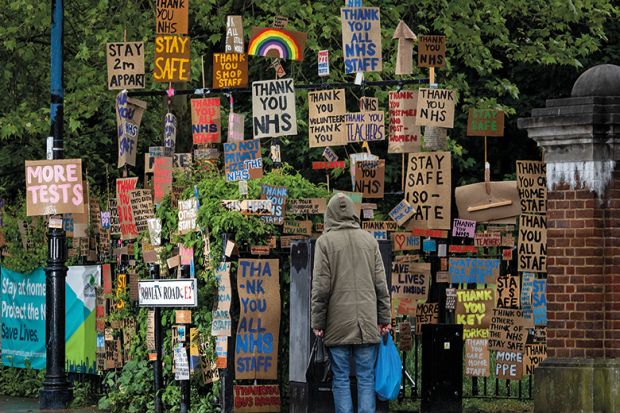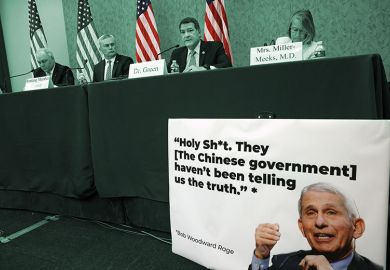Amid the masses of information being pored over by the UK’s wide-ranging Covid inquiry, the fact that the woman who is now the country’s chief scientific adviser once called the man who is now prime minister “Dr Death” stands out as a particularly stark detail – if only for the awkward questions it poses about their relationship today.
Lawyers have, for months, been digging into the innermost thoughts of those at the centre of the crisis, as told through their emails, WhatsApp messages and, in some cases, personal diaries; creating a fascinating picture of how they dealt with the public health emergency.
But will the huge undertaking – set up to examine decision-making and political governance during the pandemic – actually tell us anything beyond what was already known? And how can it inform the relationship between scientists and policymaking in the years ahead?
John Edmunds, a member of the government’s Scientific Advisory Group for Emergencies (Sage) and the recipient of the “Dr Death” messages from Dame Angela McLean – thought to have been a reference to Rishi Sunak’s “Eat Out to Help Out” scheme – admitted to Times Higher Education that it “feels very intrusive” to have private communications aired so publicly, adding, “It does make you feel like a bit of a criminal, really.”
For Professor Edmunds, a key question was whether it was for scientific advisers to urge governments to adopt the “precautionary principle” and take action early to avert greater issues later on, or merely present all the available evidence in a neutral way.
“At the beginning there wasn’t really evidence for, say, lockdowns, and very poor evidence for other things like mask-wearing,” said the professor of infectious disease modelling at the London School of Hygiene and Tropical Medicine.
“Arguably, scientific advisers should just summarise what they know as it stands but then can they be sure the precautionary principle will apply later on [as civil servants and ministers devise policies]?
“I don’t know the answer to this. It is something that needs to be properly discussed within policymaking.”
How close scientists should be to the politicians they are advising has been a constant theme of the inquiry. In his evidence, Sir Christopher Wormald, the most senior civil servant in the Department for Health, raised concerns about special advisers attending Sage meetings, worrying that this would compromise the “purity of the scientific advice”.
But scientists have also come in for criticism for sticking to their guns. Simon Case, the Cabinet secretary – whose private messages have been among the most inflammatory – said that researchers have been “slow and too purist” on issues such as wearing masks because they “don’t like the evidence base”, a criticism many scientists have themselves aired in the past.
Where the scientists and policymakers did disagree, it has been alleged by many that they were prevented from voicing concerns in public.
Christina Pagel, professor of operational research at UCL and a key member of Independent Sage – set up as an alternative to the official Sage because of questions about its transparency and independence – said the fact that scientific disquiet over certain policies is only just emerging meant that at the time they appeared to have “the legitimacy of scientific approval”.
Her colleague on Independent Sage, Kit Yates, senior lecturer in mathematical sciences at the University of Bath, agreed. “Scientists must be independent of the politicians they are advising. More than that, they must be seen to be independent and that means being able to speak freely about important issues relevant to the crisis, ” he said.
For Professor Pagel, this critical voice should extend to presenting alternative courses of action to the government’s preferred strategy.
“The Sage modelling remit was very much, ‘You do what we tell you’, and they didn’t seem to have the ability to say, ‘We think this completely different system would work better,’” she said.
Professor Edmunds rebutted this to a certain extent, with lockdowns themselves being an example of something Sage started looking into before it had been asked to do so.
But, he said, how proactive advisers should be was an open question. “There were examples when we did stray into suggesting things. I’m glad we did it but I’m not sure if, within our system, we were maybe overstepping the mark at times. There should be clearer rules for how these things work.”
Tracey Brown, chief executive of the charity Sense About Science, said the modellers were often also being asked the wrong questions, a symptom of how expertise was centralised around No 10, without drawing on the research links of other departments.
“They could have been asked, ‘Can you reach a sweet spot in reducing transmissions before you start to do damage to early years development?’ That is something that could have been modelled pretty well.
“Instead they were just asked, ‘How do you reduce transmission?’ and the answer to that is always going to be to shut the schools.”
Register to continue
Why register?
- Registration is free and only takes a moment
- Once registered, you can read 3 articles a month
- Sign up for our newsletter
Subscribe
Or subscribe for unlimited access to:
- Unlimited access to news, views, insights & reviews
- Digital editions
- Digital access to THE’s university and college rankings analysis
Already registered or a current subscriber?








